Mads Christensen
Texte intégral (1832 mots)
40 years since the bombing of the Rainbow Warrior
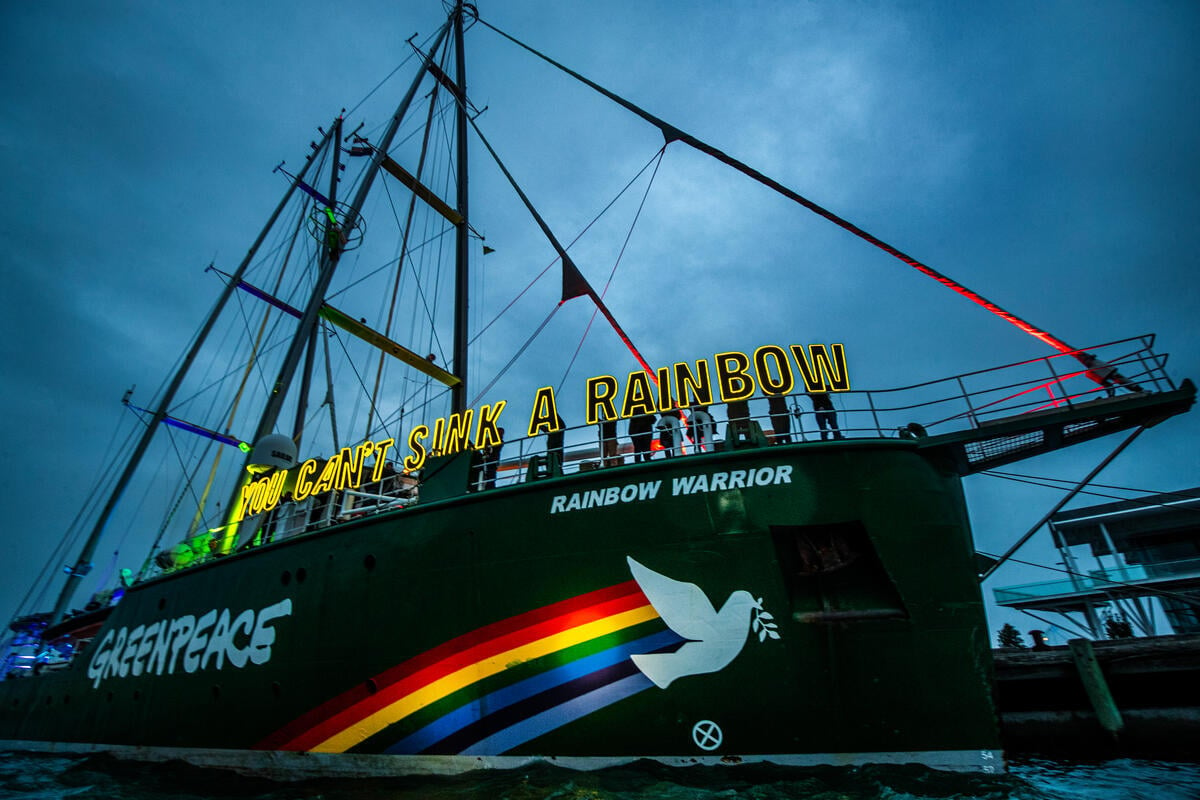
The bombing of the Rainbow Warrior, and the murder of photographer Fernando Pereira, is a reminder that there are forces in the world who will defend their self-interests and power no matter the consequences. That they will stop at nothing.
Forty years later that remains true.
But more than that it is a reminder of the power of resistance and courage that is contagious and collective. As we remember Fernando and that terrible night, we also recall the courage of the activists who stood steadfast and unbroken. Defiant as they mourned their friend. Resolute in the conviction that ‘You can’t sink a Rainbow’.
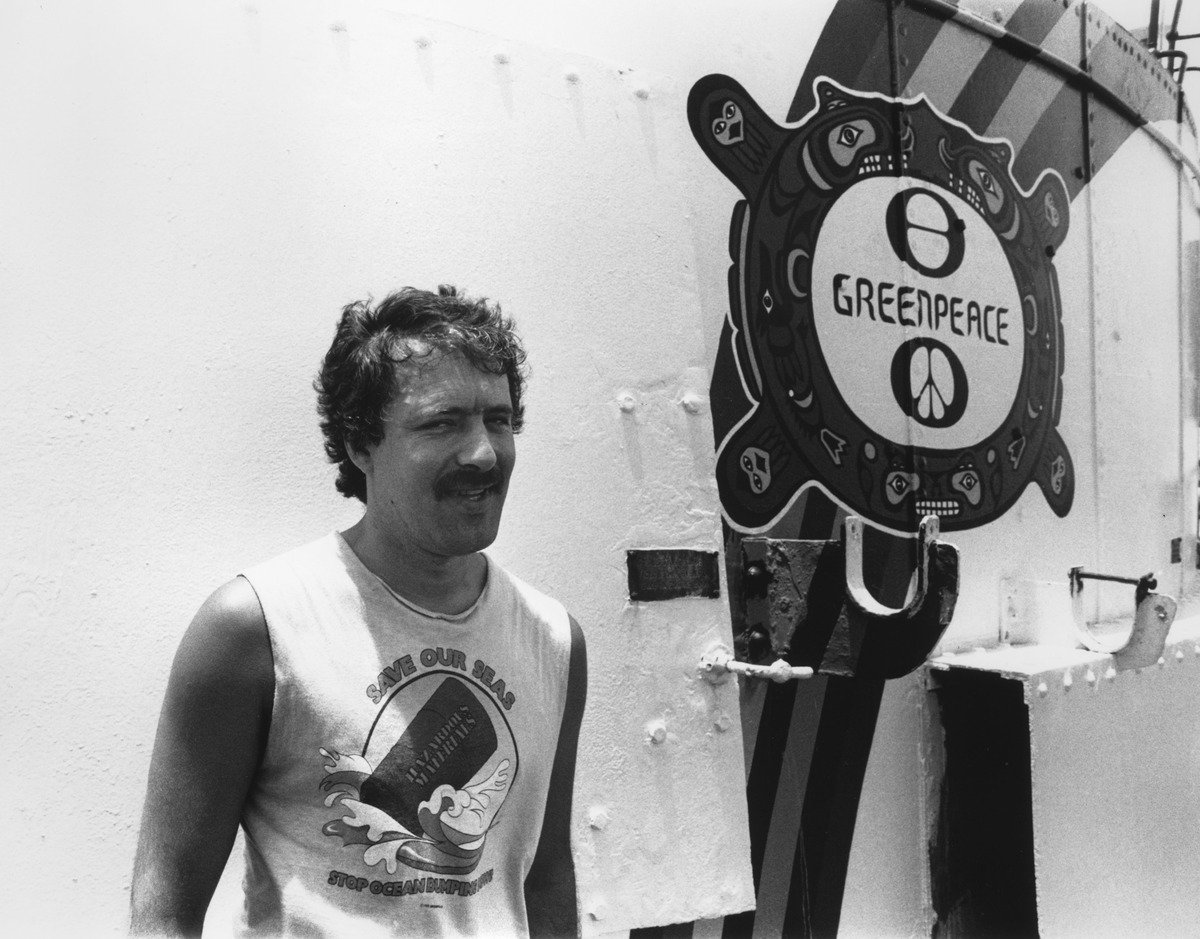
Forty years later, we need that courage more than ever. In 2025, civil society is under increased attacks from billionaires and fossil fuel companies trying to silence dissent, but we will show again that hope rises as we join together to meet this moment with increased unity and courage.
In 1985, the ship had just returned from evacuating the radiation poisoned island of Rongelap, and was refueling and conducting maintenance ahead of a planned protest against French nuclear weapons at Mururoa Atoll.
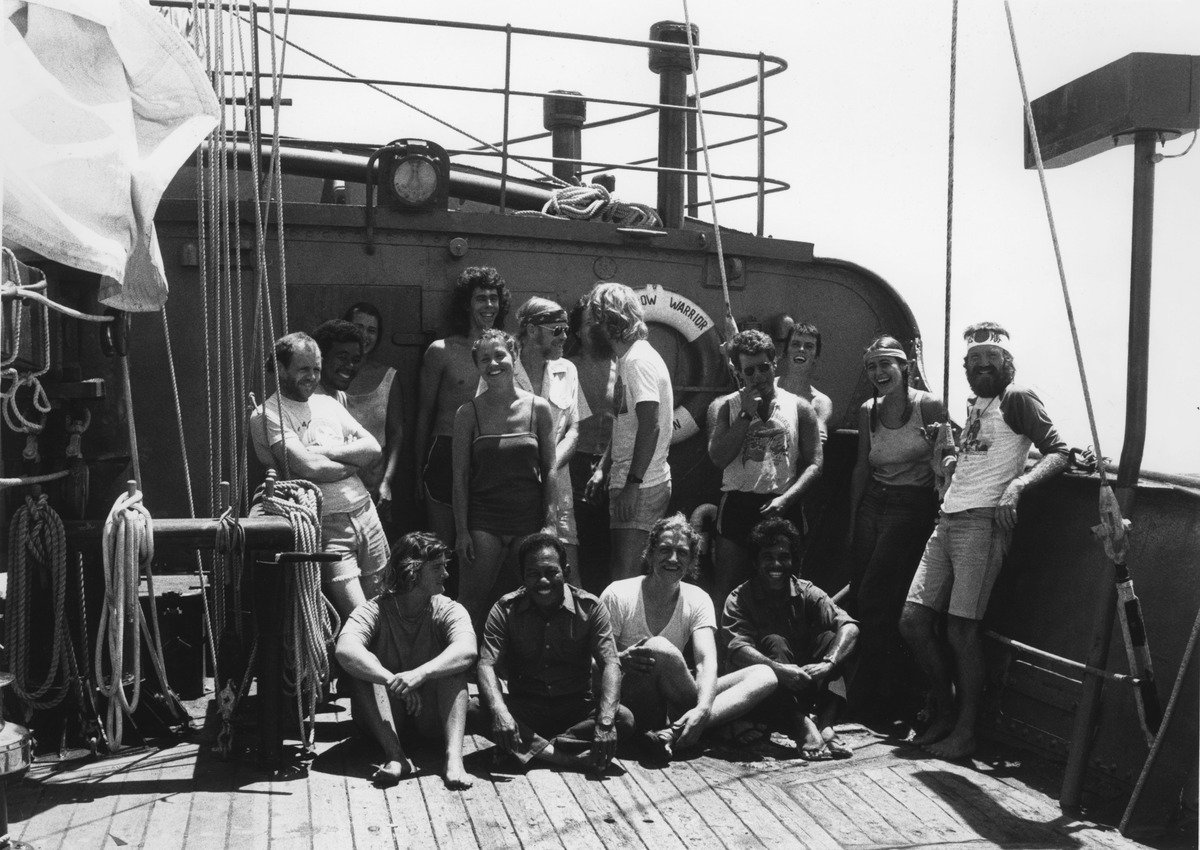
Earlier that night the crew and campaigners had been celebrating the birthday of Steve Sawyer. Most were already asleep when two frogmen slipped into the water and planted their explosives.
The twin explosions scuttled the ship, photographer Fernando Pereira, a father and a man who was committed to bearing witness to the injustices of nuclear testing in the Pacific, was murdered, caught in the sudden rush of water and drowned.
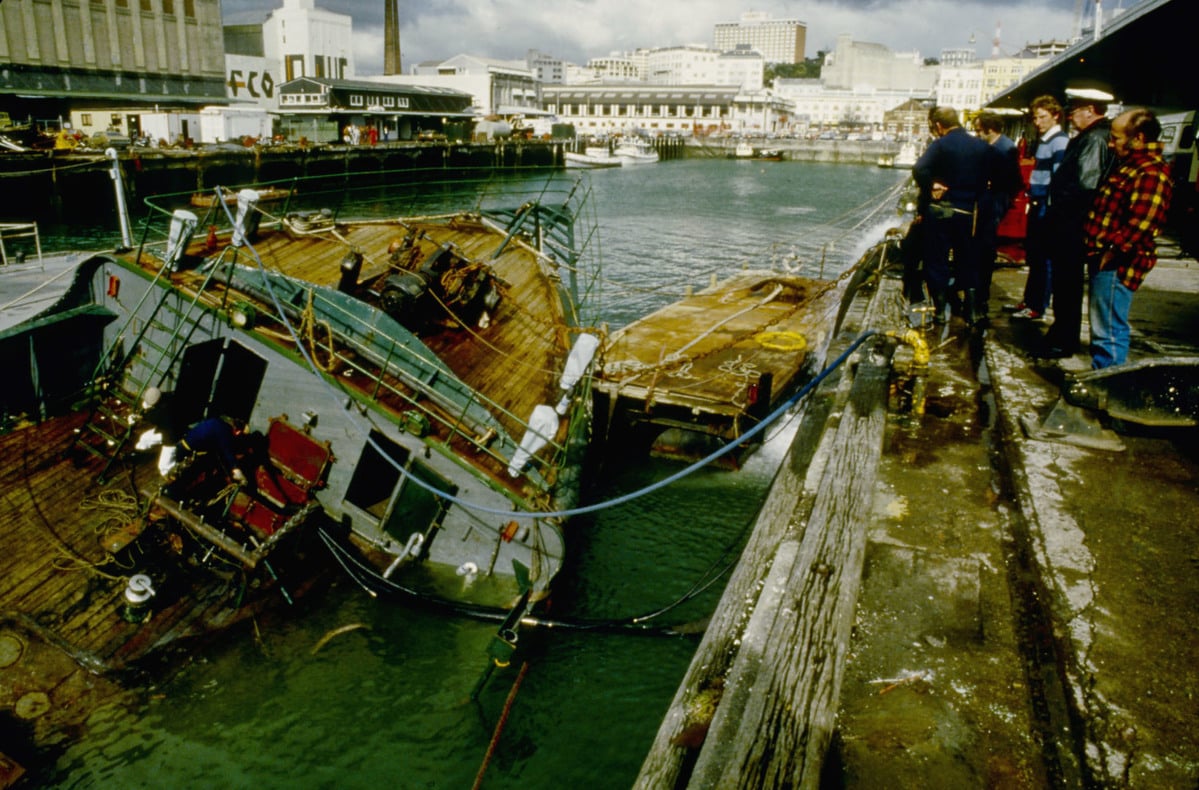
That night the French government wasn’t just trying to sink a ship – it was attempting to sink a movement, to attack activism and to silence the voice of hope.
It failed.
In the months that followed the world was outraged at the state-sponsored terrorism against peaceful protesters. The story of the bombing, as well as the nuclear tests and aftermath, became globally condemned. People around the world heard the story of the crew aboard the ship and their conviction that hope is not a passive or simple state of mind, hope is a decision to act.
Hope is is the hammer that breaks the glass in times of emergency.
Rather than back down in the face of violence, Greenpeace and the movement doubled down and continued to campaign against nuclear testing.
And in 1996, we won.
Today, as we mark the 40th anniversary of the attack and assault on activism, the forces which brought the Rainbow Warrior to Auckland Harbour are still painfully prevalent.
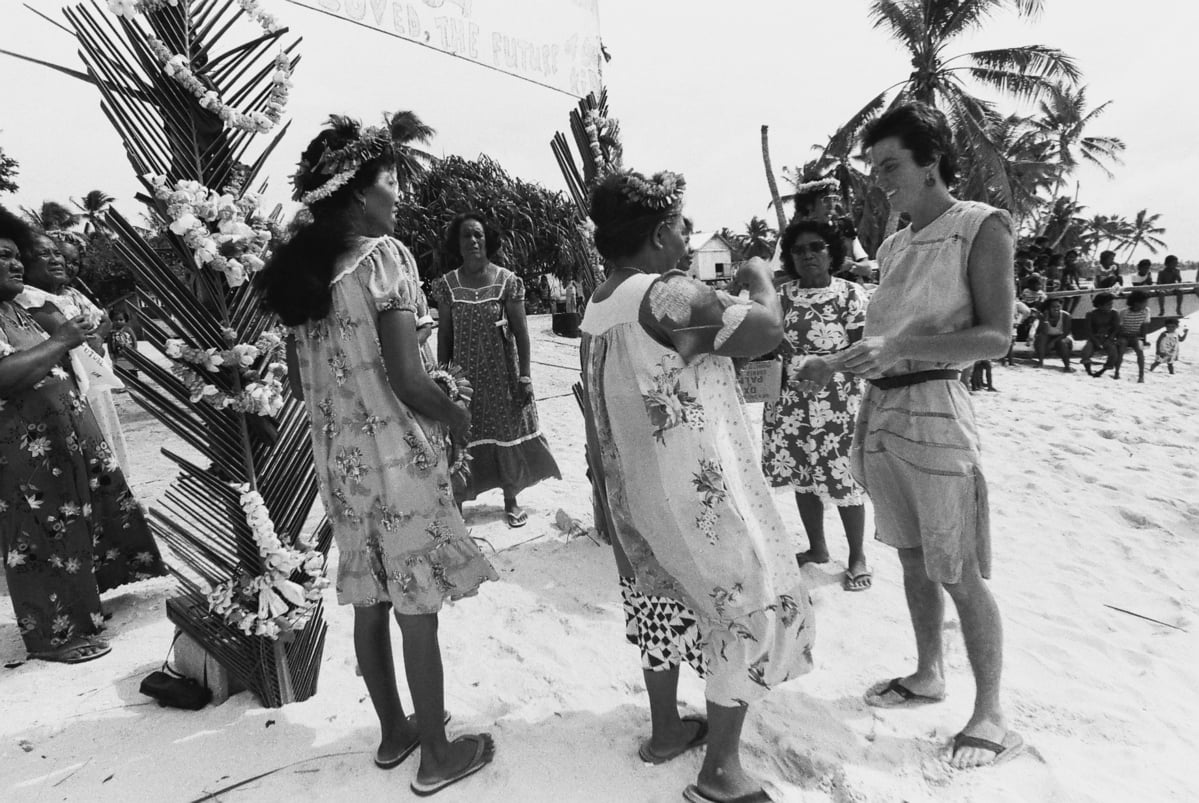
In the past few months Greenpeace has been on a tour of the Marshall Islands, documenting the ongoing legacy of nuclear testing. Generations of Marshallese people still live with the ongoing health impacts, the radioactive contamination of their land and waters, forced dislocation from their homes.
The shadow of nuclear war, rather than receding, is growing once more.
Around the world short term greed is placed over people and planet. Autocracy and oligarchy are on the rise. A might is right mentality is dominating international relations and the norms of international law are being ignored.
Attacks on activism and civil society are intensifying.
The toll from the catastrophic impacts of climate change continues to rise as many of the mechanisms which previously protected environmental or humanitarian norms are being dismantled, or ignored.
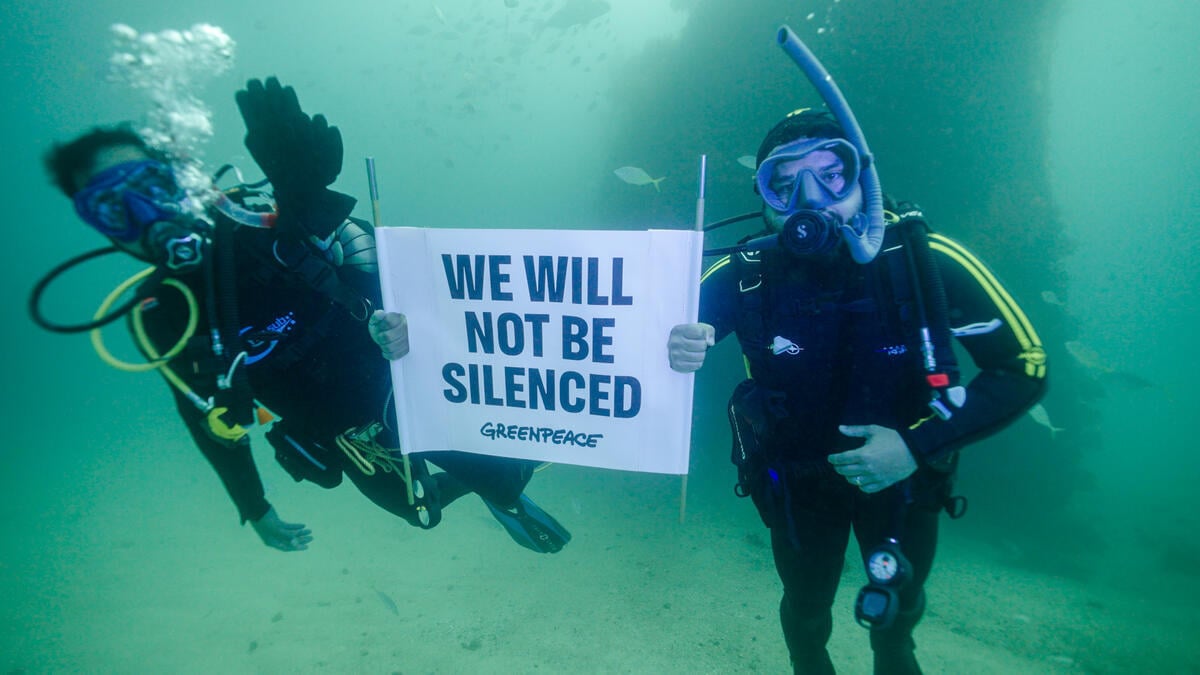
In recent months environmental and human rights organisations like Greenpeace have been subjected to legal attacks intended to cripple our ability to work. These attacks are intended to reduce our right to protest peacefully.
Bombs and bullets are being joined by legal precedents, physical sabotage is now being supplemented by legal measures meant to bankrupt organisations. The end goal is still the same: to stop those who hope for a better world from putting that hope into action.
This reality of SLAPPs – Strategic Lawsuits Against Public Participation – are legal blunt force trauma and intimidation designed to drain an organisation’s resources, and if not destroying them outright, at least destroying their ability to campaign.
The bombing of the Rainbow Warrior, and the murder of Fernando Pereira, are a sobering reminder that there are forces in the world who will defend their self-interests and damn the consequences, stopping at nothing.
On the anniversary of the bombing we should remember that not only can things change, but together we can change them for the better.
The past 40 years have taught us they only win if we give up. We didn’t. We won’t.
After the attack on the Rainbow Warrior we continued to resist, continued to campaign, and eventually…we won.
Now more than ever we must put hope into action and in doing so generate the courage to resist.
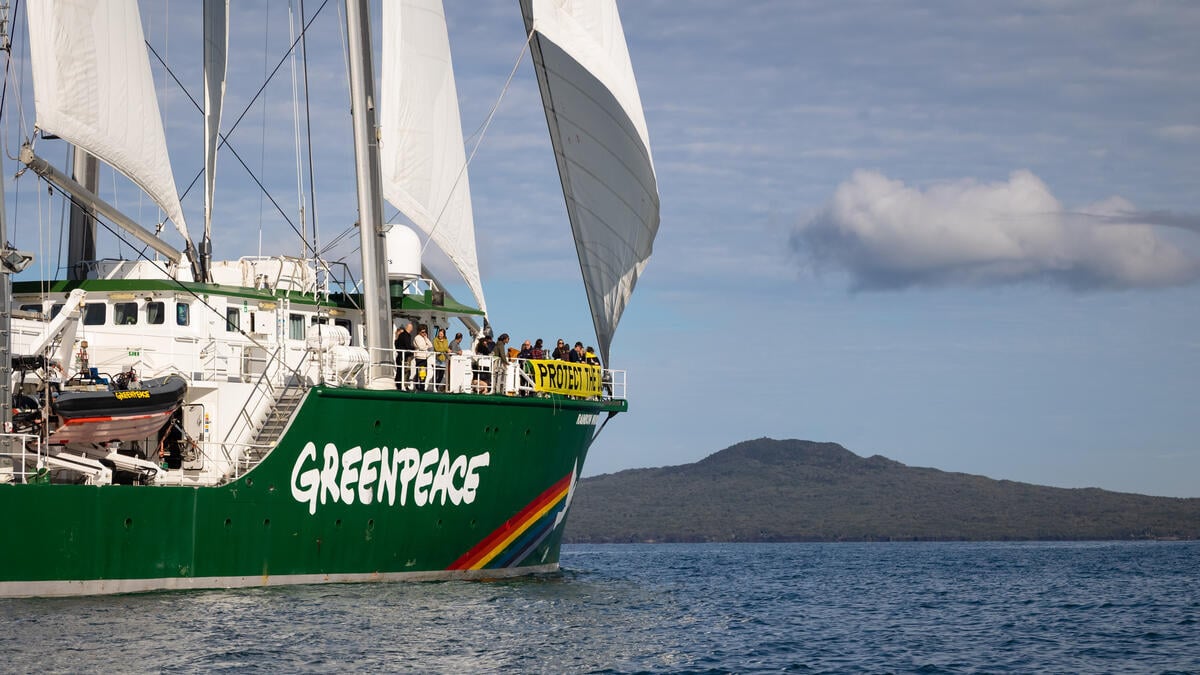
Greenpeace International
Texte intégral (1125 mots)
Brussels – As European leaders and companies are pushing for increased imports of US liquefied gas (LNG), a new report by Greenpeace USA, Earthworks, and Oil Change International highlights the climate threats and financial risks posed by five major new liquefied gas export projects proposed for the US Gulf Coast, most of them still awaiting a final investment decision.[1]
“What we found was crystal clear – any further investment in LNG is not compatible with a livable climate,” said Andres Chang, Senior Research Specialist at Greenpeace USA and lead author of the report. “The massive growth in infrastructure along the Texas and Louisiana Gulf Coast has already created significant public health and ecosystem impacts, threatening entire coastal communities. But it doesn’t stop there. We believe this report shows that, if built, these projects would put global climate goals even further out of reach.”
The report analyses five major US LNG projects – Venture Global CP2, Cameron LNG Phase II, Sabine Pass Stage V, Cheniere Corpus Christi LNG Midscale 8-9, and Freeport LNG Expansion – and finds that each would fail the climate test derived from models in the US Department of Energy’s 2024 LNG Export public interest studies.[2] Each would increase greenhouse gas emissions by edging out renewable energy and driving up global fossil fuel use, undermining the world’s ability to meet the Paris Agreement targets and driving more frequent and intense extreme weather events. The report suggests that future US administrations could therefore revoke export authorisations issued under current US President Trump.
Pressured by Trump and facing the threat of sweeping tariffs, the EU Commission is proposing increased LNG imports.[3] It has also agreed to look into direct public investments by the EU and its member states in gas export facilities outside the EU – including potentially the five US LNG projects analysed in this report – in its Affordable Energy Action Plan released in February 2025.[4]
“Increasing US gas imports will deepen Europe’s dependence on the US, making the EU and national governments even more vulnerable to Trump’s political extortion. EU leaders must break free from fossil fuel dependency and take control of Europe’s future by investing in a renewable, secure and peaceful energy system. A ban on all new fossil fuel projects in the EU would be the right first step, certainly not funding projects abroad,” said Thomas Gelin, Greenpeace EU climate and energy campaigner.
Another result of Trump’s pressure is the calls by some Member States and other EU policymakers to weaken the EU methane regulation, which was adopted just last year, in order to continue importing US liquefied gas despite the fact that its production – mostly coming from fracking – is associated with particularly high methane emissions.[5][6]
“This report adds to a rapidly growing body of evidence that financing U.S. LNG is not a sound decision for insurers, investors, or purchasers – something the EU and America’s Asian allies must keep in mind as President Trump pressures them to increase their imports of U.S. LNG under threat of sweeping tariffs. Countries with climate commitments, such as those in the EU, should be very wary of the climate cost of importing US LNG,” said Dr Dakota Raynes, Senior Manager of Research, Policy, and Data at Earthworks.
European energy companies have already signed long-term purchase agreements for four of the projects analysed in the report. These contracts extend well beyond 2035, the year by which Europe must phase-out fossil gas if it is serious about meeting its international climate commitments. These companies include SEFE (Germany), BASF (Germany), GASTRADE S.A. (Greece), DTEK (Ukraine), TotalEnergies (France), PKN Orlen (Poland), Gap (Portugal) and Equinor (Norway) – several of which are fully or partially state-owned.[7]
“Fossil fuel dependency has long externalized its true costs, forcing communities to bear the burden of pollution, sickness, and economic instability,” says James Hiatt, founder and director of For a Better Bayou. “For decades the oil and gas industry has known about the devastating health and climate impacts of its operations, yet it continues to expand, backed by billions in private and public financing. These harms are not isolated – they’re systemic, and they threaten all of us. This report is a call to conscience. It’s time we stop propping up deadly false solutions and start investing in a transition to energy systems that sustain life, not sacrifice it.”
Greenpeace calls on EU leaders to stop new long-term purchase agreements for liquefied gas and drop the proposal for direct financial investments in gas export facilities. Instead, the EU should impose a ban on all new fossil fuel projects, including new liquefied gas import terminals, stop all public investments in fossil fuel infrastructure and agree to end fossil gas by 2035 at the latest.
ENDS
Notes:
Read the full report: Failing the climate test: LNG projects awaiting final investment decision do not stand up to US Government analysis
Read the European media briefing
Watch the press conference recording
[1] At the time of drafting of the report, all five were awaiting a final investment decision. On June 24, 2025, Cheniere Corpus Christi LNG announced a positive final investment decision.
[2] December 2024 | ENERGY, ECONOMIC, AND ENVIRONMENTAL ASSESSMENT OF US LNG EXPORTS
[3] Trump says EU must buy $350B of US energy to get tariff relief – POLITICO
[4] Action Plan for Affordable Energy
[5] The Member States are: Bulgaria, Czechia, Greece, Hungaria, Romania, Slovakia and Slovenia.
[6] Liquefied natural gas carbon footprint is worse than coal | Cornell Chronicle
[7] Source: Sierra Club US LNG Export Tracker, date as of 4 June 2025
Contacts:
Katie Nelson, Senior Communications Specialist, Greenpeace USA, +1 (678) 644-1681, (GMT -8), knelson@greenpeace.org
Greenpeace International Press Desk, +31 (0) 20 718 2470 (available 24 hours), pressdesk.int@greenpeace.org
Greenpeace International
Lire plus (479 mots)
Amsterdam – Responding to a rapid study by scientists at Imperial College London and the London School of Hygiene & Tropical Medicine that found that the number of heat-related deaths across 12 European cities tripled due to the climate crisis in the 10 day period between 23 June and 2 July, as well as to preliminary data published by the Copernicus Climate Change Service that June 2025 was the hottest ever June for Western Europe and the third-warmest June globally.[1][2]
Ian Duff, Head of Greenpeace International’s Stop Drilling Start Paying campaign said: “It is society’s most vulnerable – in Milan, Barcelona, Paris, London and elsewhere – who suffer most in the midst of record temperatures. Europe’s dependence and soft hand on oil and gas corporations who are fueling this extreme heat is giving a death blow to our parents and grandparents.”
“This heatwave comes when public finances are already stretched and it is only fair that those most responsible are made to pay. For European cities to become safe spaces for society’s most vulnerable, polluters like Shell and TotalEnergies must face fines and taxes to pay for soaring climate and health costs.”
Beyond excess mortality, the latest heatwave in Europe resulted in restrictions on outdoor work hours in Italy, the closure of more than 2,200 schools in France, and wildfires breaking out in Greece, Spain, and Turkey.
Eight out of 10 people support taxing oil and gas corporations to pay for climate damages, according to a global survey commissioned by Greenpeace International and Oxfam International. The two organisations are part of the Polluters Pay Pact, a global alliance of over 170,000 people, including first responders like firefighters, humanitarian groups and political leaders. It demands that governments around the world make oil, coal and gas corporations pay their fair share for the damages they cause
ENDS
Notes:
[1] “Climate change tripled heatwave death toll in European cities during last week’s heatwave” – Imperial College London and the London School of Hygiene & Tropical Medicine
[2] “Third-warmest June globally – Heatwaves in Europe amid temperature extremes across both hemispheres” – Copernicus
Contact:
Tal Harris, Global Media Lead – Greenpeace International’s Stop Drilling Start Paying campaign, +41-782530550, tharris@greenpeace.org
Greenpeace International Press Desk: +31 (0) 20 718 2470 (available 24 hours), pressdesk.int@greenpeace.org
Bon Pote
Actu-Environnement
Amis de la Terre
Aspas
Biodiversité-sous-nos-pieds
Bloom
Canopée
Décroissance (la)
Deep Green Resistance
Déroute des routes
Faîte et Racines
Fracas
F.N.E (AURA)
Greenpeace Fr
JNE
La Relève et la Peste
La Terre
Le Lierre
Le Sauvage
Low-Tech Mag.
Motus & Langue pendue
Mountain Wilderness
Negawatt
Observatoire de l'Anthropocène
